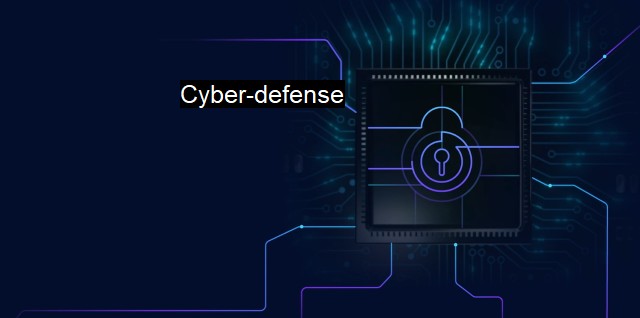What is Cyber-defense?
Defending Against Cyber Threats: The Importance of Cybersecurity in Today's Technological World
Cyber-defense is an integrated set of strategies, methodologies, and technologies used to detect, prevent, and mitigate cybersecurity threats to digital infrastructure. Its main components include network security, application security, endpoint security, data security, cloud infrastructure security, and laws related to computing and internet-based activities.In particular, cyber-defense plays an essential role in securing computing systems from various types of malwares. One such prevalent malware are the computer viruses that infect the system stealthily and cause significant damage by altering codes, wiping out data or even leading to identity theft. Therefore, the application of rigorous cyber-defense becomes increasingly important to shield systems from potential viral threats and to ensure the protection of digital space.
In terms of cybersecurity, cyber-defense embodies proactive measures to prevent attacks. It presents advanced strategies to ensure safety on the internet, using specific cybersecurity software, tools, and techniques designed to secure a system or network against possible threats or breaches. A fully developed and implemented cyber-defense program can help organizations to identify vulnerabilities, potential threats, and attacks early enough and allow them to take corrective measures to manage associated risks and minimize damages.
Antivirus software is a critical component of the cyber-defense catalytic system. Antivirus programs are designed to detect, block, and remove earmarked viruses operating in a computer system. This defense slot often characterizes in terms of an all-encompassing strategy incorporating functionalities such as signature-based detection, behavioral-based detection, and sandbox detection. By employing real-time scanning, such software burrows into each file, systematically scanning for potential threats. Added layers to cyber-defense like firewall enforcement, intrusion detection systems (IDS), and intrusion prevention systems (IPS) are deemed necessary and work in combination with antivirus programs to amplify the cyber security umbrella.
Advanced cyber-defense capabilities such as data encryption, secure online surfing, privacy protection, password management, and VPN security can perform as an added shield in curtailing unauthorized user access and data shredding. Such capabilities not only optimize onsite data protection but also maintain secure networking mechanisms, encryption, authentication, and authorization with a liberty of customization based on the sensitive range of data and information handled by organizations and businesses.
The context of ever-evolving cyber threats and cyber skirmishes globally stresses the vitality of cyber-defense advancements. Fierce advancements in unethical hacking techniques, burgeoning innovation in disruptive technologies like Artificial Intelligence, Machine Learning, and Quantum Computing insinuate the necessity to adapt and grow with timely development in cyber-defense mechanisms. By fostering knowledge incorporating up-to-date technologies, and employing a conscious mindset towards accumulating potential threats, organizations can most definitely keep up in the face of evolving cyber adversity.
Beyond its well-understood domain of protecting systems and information, cyber-defense fundamentally encompasses areas such as legal issues related to cybercrime and the ethical considerations of computing and internet use. Given the global nature of the internet, the legal framework and enforcement mechanisms need to be robust and versatile to deal with crimes that might emerge from virtually anywhere in the world. Thus, established cyber-defense frameworks include measures on effective judicial recourse and regulations to handle online criminal activities.
In recap, cyber-defense serves as the first line of protection in our interconnected digital realm. Reliable cyber-defense is a combination of a rigorous process, advanced technologies, antivirus software, and adherence to regulations to protect privacy, confidentiality, and integrity, ensuring a safe and secure digital environment.

Cyber-defense FAQs
What is cyber-defense?
Cyber-defense refers to the practice of protecting computer systems, networks, and devices from unauthorized access, theft, damage, and other cyber threats. Cyber-defense techniques can include antivirus software, firewalls, encryption, and other security measures designed to prevent or mitigate cyber attacks.What is antivirus software?
Antivirus software is a program that detects, prevents, and removes malware (malicious software) from computer systems. It typically works by scanning files and programs for known patterns of malicious code, and can also use behavioral analysis to detect and block suspicious activity. Antivirus software is an important component of cyber-defense strategies, as malware can be used to steal data, damage systems, and cause other types of cyber attacks.How can I protect my computer from cyber attacks?
There are several measures you can take to protect your computer from cyber attacks. These include: 1. Installing and regularly updating antivirus software 2. Installing security updates and patches for your operating system and other software 3. Using strong and unique passwords for your accounts and devices 4. Avoiding suspicious emails, links, and downloads 5. Enabling two-factor authentication for your online accounts 6. Backing up important files and data to an external hard drive or cloud storage service 7. Being cautious when using public Wi-Fi networks 8. Regularly monitoring your accounts and devices for signs of unauthorized access or unusual activityWhat is a firewall?
A firewall is a network security device that monitors and controls incoming and outgoing network traffic based on predetermined security rules. Firewalls can block unauthorized access to network resources and prevent cyber attacks by filtering traffic at the application, transport, and network levels. They can also be used to detect and respond to suspicious activity, such as malware or hacking attempts. Firewalls are an important component of cyber-defense strategies for both individual users and organizations.| | A | | | B | | | C | | | D | | | E | | | F | | | G | | | H | | | I | | | J | | | K | | | L | | | M | |
| | N | | | O | | | P | | | Q | | | R | | | S | | | T | | | U | | | V | | | W | | | X | | | Y | | | Z | |
| | 1 | | | 2 | | | 3 | | | 4 | | | 7 | | | 8 | | |||||||